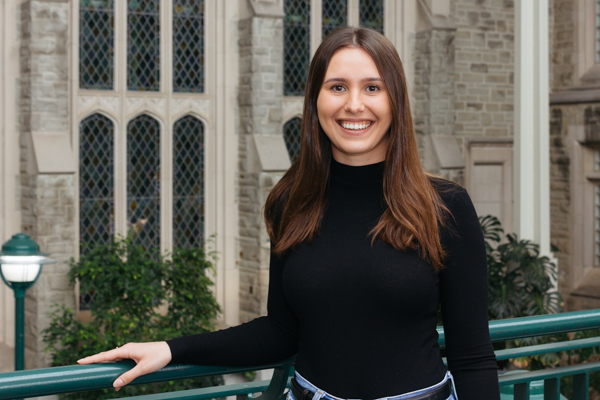Admissions
Equity, Diversity, Inclusion and Decolonization
The School of Graduate and Postdoctoral Studies is committed to equity, diversity, inclusion and decolonization in all aspects of graduate and postdoctoral studies. For more information regarding these commitments please visit grad.uwo.ca/edi-d.
Biochemistry
Master of Science (MSc)Meet Olha Haydaychuk, MSc student in Biochemistry

What is it about your grad program that enables you to thrive?
I appreciate how helpful and supportive all my peers are. Everyone in my graduate program is always willing to let you bounce ideas off them, or give you advice based on their experience.
Describe your research.
Genome editing nucleases have drastically enhanced the ability to manipulate genomes and have great potential to treat genetic diseases; however, therapeutic applications of gene editing nucleases are limited by their off-target activity at sites similar to the desired target. I am developing a novel bacterial system to engineer nuclease variants towards a respective target and away from undesired targets simultaneously. My project focuses on engineering one of the dominant gene editing nucleases, CRISPR-Cas9.
Do you engage in volunteer activities?
I am the co-chair of the Canadian Cancer Society’s Research Information Outreach Team (RIOT). We aim to spread the progress and promise of cancer research to the community.
What’s the best advice you could give to someone considering applying to your graduate program?
Undergraduate research project courses are helpful in deciding whether you want to go into research and whether you enjoy a project. Ensure that you talk to graduate students to find out more about the research being done in the lab, potential projects, and about how the lab functions prior to joining. Research is really appealing when thinking about promising experiments and results. Having a project you are really interested in and good mentors can help you get through the tough times and keep you motivated.
Program Websites
Program Contact
Megan Luckovitch (mluckovi@uwo.ca)Graduate Assistant
Department of Biochemistry
Western UniversityMedical Sciences Rm 342
London, Ontario N6A 5C1
t. 519-661-2111 ext. 83074
Biochemistry is used to study living systems at the molecular level. The research of our MSc students spans a variety of interconnected fields that aim to understand and treat human disease and improve human health and well-being.
Several groups are studying human genetics, genome dynamics and epigenetics, and the regulation of gene expression, including the regulatory roles of RNA. Others are focused on protein structure and function, proteomics, and cellular signalling. Computational approaches and bioinformatics are becoming increasingly integrated into biochemical research. And new technologies are enabling efforts to engineer biological systems for research and biotechnology, ushering in the exciting new era of synthetic biology that includes the editing and synthesis of genomes, genetic code expansion, and the creation of new biosynthetic pathways and even new organisms.
Program Length
- 3 Terms (Project-based)*
- 6 Terms (Thesis-based)
*Please note: the three-term project-based program is currently not accepting applications.
Program Design
- Full-time study
- Project-based or thesis-based
Funding Information
Applicants are encouraged to apply for the following scholarships (if eligible):
Tuition and Fees
Tuition and fee schedules (per term) are posted on the Office of the Registrar's website at http://www.registrar.uwo.ca/student_finances/fees_refunds/fee_schedules.html
Graduate Student Affordability Calculator
Use this helpful tool to estimate how much money you will need to pay for your tuition, fees, housing, food, and other necessities for a 12-month (three term) academic year.
Admission Requirements
- BSc in biochemistry, biology, genetics, chemistry, cell biology, microbiology, physiology or closely related disciplines.
- Minimum 78% GPA in the undergraduate degree.
English Language Proficiency
Applicants whose first language is not English must furnish evidence of their proficiency in the use of the English language:
- The Test of English as a Foreign Language (TOEFL). Minimum acceptable score is 600 for the paper and pencil version, 250 for the computer version, or 90 for the internet version with no individual score below 22. [Western's TOEFL ID is 0984].
- The International English Language Testing Service (IELTS Academic). Minimum acceptable score is 6 out of 9.
- The Canadian Academic English Language Assessment (CAEL Assessment). Minimum acceptable score is 60.
Application Deadline
Domestic
- October 1 (for January start)
- February 1 (for May start and first round considerations for September start)
- June 1 (for September start)
International
- July 1 (for January start)
- November 1 (for May start)
- March 1 (for September start)
Acceptance notifications begin as soon as your application is completed and reviewed.
Fields of Research
- Bioinformatics
- Genome Dynamics, Epigenetics, and Gene Expression
- Human Genetics and Clinical Biochemistry
- Macromolecular Structure and Dynamics
- Proteomics
- Signal Transduction and Intercellular Communication






